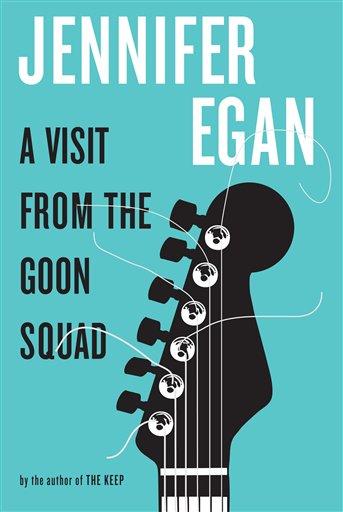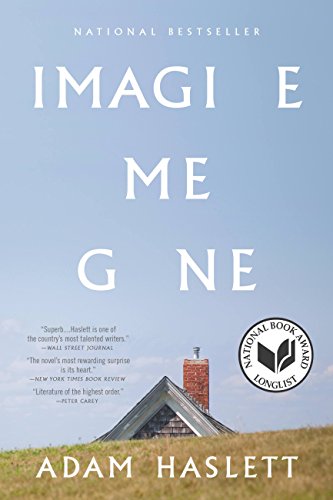
May fiction roundup! “A Visit from the Goon Squad”, “Imagine Me Gone”, and “White Teeth”.

Maybe I’m just a sucker for interconnected short stories, but A Visit from the Goon Squad by Jennifer Egan (4.5/5) blew me away. And I still haven’t digested what it’s about — it’s a tangle of scarred arteries, disillusioned lives intersecting, brought together by art or music or some form of escape. Her stories introduce us to all manner of selfish people: kleptomaniacs, junkies, cheating spouses, genocidal warlords, hollowed-out starlets and the sad men they bewitch. They occupy a space somewhere between human and hyperbole; it’s never quite clear if you should be laughing or crying, sitting with them in the trenches or marveling from the heights of her rollercoaster prose. Come for the electric style and wild flights of fancy, but stay for the shared humanity lurking underneath.
“Yet each disappointment Ted felt in his wife, each incremental deflation, was accompanied by a seizure of guilt; many years ago, he had taken the passion he felt for Susan and folded it in half, so he no longer had a drowning, helpless feeling when he glimpsed her beside him in bed: her ropy arms and soft, generous ass. Then he’d folded it in half again, so when he felt desire for Susan, it no longer brought with it an edgy terror of never being satisfied. Then in half again, so that feeling desire entailed no immediate need to act. Then in half again, so he hardly felt it. His desire was so small in the end that Ted could slip it inside his desk or a pocket and forget about it, and this gave him a feeling of safety and accomplishment, of having dismantled a perilous apparatus that might have crushed them both.”
“Watching her, I saw it all: the small, overheated apartment strewn with running shoes and leotards, the biweekly dinners at her parents’, the soft dark fuzz on her upper lip that she bleached each week with a tart-smelling white cream. And the feeling I had was not of wanting her so much as being surrounded by her, blundering inside her life without having moved.”

Imagine Me Gone by Adam Haslett (3.5/5) also uses humor as a means of defanging — a “sleight of mind” as one character says — the darker side of the human experience. But here the target is more specific than ennui: it’s mental illness. Not just its effect on the afflicted, but the strain it causes in the people who love them; that endless desire to “solve” or “fix”; the impotence of learning you can’t; the way empathy acts as a vicious feedback loop, with their burden becoming your burden and their awareness of said transaction only increasing, rather than splitting, the original burden’s weight. It’s the story of a five-person family, over a period of three decades, trying to navigate that circuit. Haslett gives each family member space to narrate their saga, and the way he captures the distinct voice — and thought patterns — of each is masterful. At the center of it all is Michael, anxious and brilliant and loving and manic; a person who couldn’t be any of those things without being all of them. He’s what makes the book really shine. Haslett’s isn’t a story of mental illness deflected by humor; it’s a story about how that same illness can be simultaneously tragic and hilarious, can inform a personality, can become a thing you miss when it’s finally gone.
“What do you fear when you fear everything? Time passing and not passing. Death and life. I could say my lungs never filled with enough air, no matter how many puffs of my inhaler I took. Or that my thoughts moved too quickly to complete, severed by a perpetual vigilance. But even to say this would abet the lie that terror can be described, when anyone who’s ever known it knows that it has no components but is instead everywhere inside you all the time, until you can recognize yourself only by the tensions that string one minute to the next. And yet I keep lying, by describing, because how else can I avoid this second, and the one after it? This being the condition itself: the relentless need to escape a moment that never ends.”

For all its humor, Imagine Me Gone left me drained. Fortunately, Zadie Smith was standing in the wings with White Teeth (4/5), a work which pumps life into you with manic force. I could try to dissect the themes of this book: the immigrant experience, the feeling of occupying two worlds (or, more accurately, no worlds), the way religion and history provide an anchor to cling. But it’d be virtually impossible to describe the actual story: the Bangladeshi veteran with a withered hand, the doomsday-shouting Jehovah’s Witnesses, the vegans of FATE and fundamentalists of KEVIN and Clara with her no front teeth and Archie with his coin flips and the histories and generals and earthquakes and…it’s too much to explain, and besides, explaining would kill it. “Zany” can sometimes be a condescending word, but here it’s a phenomenal strength: Smith’s story is jarring and fantastical, and she leads you through it less like an historian than an excitable tour guide, veering from alleyway to mental alleyway, rolling back in history only to rev through the present, shouting on a megaphone from a double-decker bus while the sights and sounds of London overwhelm. Some have criticized her prose as self-conscious and “pretentious”, but I was floored by its clarity and unyielding desire to steer. It’s absolutely insane that she wrote this in her early twenties — but at the same time, it’s hard to imagine anyone more accomplished possessing the sheer audacity. Vonnegut comes to mind, but Vonnegut has never felt this urgent, this manic. I loved her ability to weave together such a diverse cast of characters, and the insightful gems she drops so casually you’d think they were formed by mistake. It’s a breathless, exhilarating ride.
“Irie wished she could give herself over to these past-present fictions: wallow in them, make them sweeter, longer, particularly the kiss. But she had in her hand a cold key, and surrounding her lives that were stranger than fiction, funnier than fiction, crueler than fiction, and with consequences fiction can never have. She didn’t want to be involved in the long story of those lives, but she was, and she found herself dragged forward by the hair to their denouement, through the High Road—Mali’s Kebabs, Mr. Cheungs, Raj’s, Malkovich Bakeries—she could reel them off blindfold; and then down under pigeon-shit bridge and that long wide road that drops into Gladstone Park as if it’s falling into a green ocean. You could drown in memories like these, but she tried to swim free of them. She jumped over the small wall that fringed the Iqbal house, as she had a million times before, and rang the doorbell. Past tense, future imperfect.”
“But multiplicity is no illusion. Nor is the speed with which those-in-the-simmering-melting-pot are dashing toward it. Paradoxes aside, they are running, just as Achilles was running. And they will lap those who are in denial just as surely as Achilles would have made that tortoise eat his dust. Yeah, Zeno had an angle. He wanted the One, but the world is Many. And yet still that paradox is alluring. The harder Achilles tries to catch the tortoise, the more eloquently the tortoise expresses its advantage. Likewise, the brothers will race toward the future only to find they more and more eloquently express their past, that place where they have just been. Because this is the other thing about immigrants (’fugees, émigrés, travelers): they cannot escape their history any more than you yourself can lose your shadow.”
“Because immigrants have always been particularly prone to repetition—it’s something to do with that experience of moving from West to East or East to West or from island to island. Even when you arrive, you’re still going back and forth; your children are going round and round. There’s no proper term for it—original sin seems too harsh; maybe original trauma would be better. A trauma is something one repeats and repeats, after all, and this is the tragedy of the Iqbals—that they can’t help but reenact the dash they once made from one land to another, from one faith to another, from one brown mother country into the pale, freckled arms of an imperial sovereign. It will take a few replays before they move on to the next tune.”